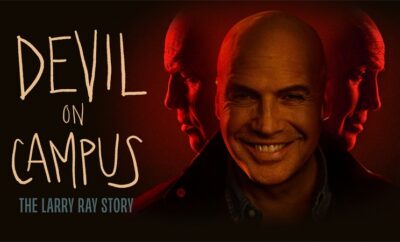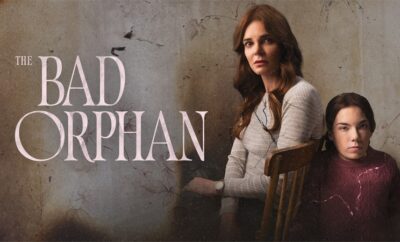Interviews
Callie Thorne – Starving In Suburbia
Q) What made you want to be a part of the movie Starving In Suburbia?
A) It’s something that came along right after “Necessary Roughness” let out and it was perfect timing. It was a perfect storm of great director and some actors I knew and some I didn’t. I was thrilled when it came to me.
Q) This is also an issue that comes up for actors, singers and anyone in a spotlighted profession. Is this something you’ve come across in your life?
A) Yes and it’s something I talked about with the director before we started shooting. You certainly hear about celebrities and just anybody about body disorders whether it is anorexia or bulimia. Although, as interested as I was in the end to do the movie, the idea for it is so rampant on the internet. It’s really very frightening. When I was younger, there were anorexia clubs. What they were was a club that taught you how to lose weight and doing it without your parents knowing. I grew up with a mother who taught us to have a healthy body image and have a healthy attitude towards food. There were some scary things we’d hear about and one of the things is actually in the movie. They teach Laura Slade’s character to punch herself in the stomach as one of the tricks when she would have hunger pains. As I grew older, and certainly as I got into the business, I started to understand things a lot more. With Hollywood, there is this idea of perfection. There is no sense of age, everyone just has this sense of insecurity; what people will do to themselves and how they’ll hurt themselves to get somewhere that is unreachable.
Q) Since you are portraying a mother in the film, did it give you a different perspective on eating disorders?
A) I did. I don’t have children and always when I play a mother it means I have to become very connected to the actors playing my children because I have to find a base level of love, protection and compassion with that person. There were certain moments that were so difficult to see. A lot of times with television, before you shoot a scene we’ll block it. That means you say, “I’m going to go this way” and they’ll put tape on the floor so the cameramen know which way you are going. There was this sense that even though we were just blocking and reading the words, it was really hard. I actually started to imagine my mother, which is something that I hadn’t done in regards to the idea of finding out your child is hurting themselves. Even though that wasn’t the case with my mother, we were very open – my sister and I. There weren’t a lot of secrets and we would go to her with questions when we were confused, scared and having an identity crisis. But I suddenly had this image of my mom opening these closets with food that I had hidden and this whole time not being aware, suddenly faced with what is essentially a horror. You’re coming face to face with the idea that your child is slowly killing themselves. I definitely learned about being more compassionate when people are complaining about their weight and saying to them, “You look perfect. You look great.” Rather say, “There actually is no ‘perfect.’ If there were, you are it.” This is the way we were born and this is how we have to love ourselves. I learned not to be so laissez faire about it because there are women my age that are fighting insecurities that young girls also face. And men, too!
Q) Do you feel like the media and magazines help promote this stereotype?
A) I believe in it so much that I put a ban on it for myself. There are very few award shows that I watch and I don’t watch any of the magazine shows unless a friend of mine is on there pressing something. I don’t read any gossip magazines anymore because though I have a healthy image in regards to my body, my soul and mind and I sort of get through things as they come – I fall prey as easy as the next person of looking at some movie star and thinking, “How come I don’t look like that,” or “Why didn’t I get that job?” Or I’ve just fallen prey to jealousy. Jealousy can be as toxic as any other negative thought or emotion. It also can be a downward spiral into body issues as well as self esteem issues on any level. I find myself to be a much happier and calm person when I am not engaging these things that perpetuate the Hollywood myth of princes and princesses. These perfect people that who – let’s face it – are Photoshopped. Nowadays, there is so much CGI going on with people’s appearances. It’s happened to me and it’s made me very sad. It made me think, “Are you saying my face, as is, isn’t attractive enough? That people aren’t going to watch me if you don’t take out the circles from under my eyes, which I was born with – thank you very much!” When it happens to you, it’s feels even more as a betrayal of what you were born with. I fall prey to it all the time and that’s why I can’t buy those magazines or watch those shows. That’s one of the reasons I am so thrilled that Lifetime bought this movie. I’d be excited if it became in an indie on the festival circuit, but the way that things have turned out means a much bigger audience and I hope that it will be an all age, male and female thing.
Q) Was there anything that you added to the role that wasn’t originally scripted for you?
A) A little bit. Tara [Miele] really wrote an incredible place for me. She really knew what she was talking about. So, there really wasn’t many places where I wanted to change our conversations. I don’t think any of the actors felt there were places we had to change or add. It’s very interesting because originally my character began being very strict about food. She was kind of regimented that way. It added to the idea that the daughter was under extreme pressure. We had a very small conversation about it. I didn’t question that because we all knew mothers like that. We knew fathers like that. I wondered though if that was even necessary because kids have so many pressures anyway that I wondered what it would be like if she had this mother who would serve dinner and just not be aware. It was less about a mother that had intentions for her daughter to be thin as opposed to someone who was just not aware. It doesn’t mean that she doesn’t love her daughter and it doesn’t mean that she is careless. I think there are a lot of mothers like that. I liked the idea more that the mother just thought that everything was fine instead of paying more attention to these red flags that are new to us because of the Internet. It’s terrifying. There is a very interesting line in the movie that once the mother has caught on a little bit to what is happening on the computer, the mother says she wants her daughter’s password and she says, “No. This is my business.” The line I have is, “No. It’s not your business. It’s not private. This is public.” I think it’s very interesting because whatever people are doing out there and putting out there, whether it is for good or for bad, it is all at our finger tips and young people (girls and boys) are so susceptible. It just seems with social media you think all these people (celebrities) are so attainable. We know these things about their life because they tweet about it. But they are still being Photoshopped to look like they are better than they really are, which I think is a horrific thing because that propels the myth as well. It’s sort of a vicious circle if you don’t stay aware.
Q) Are you looking forward to connecting with people on Twitter when the movie premieres?
A) Absolutely! I would love it if it opened up a discussion before, after or during the movie. Of course, I don’t know statistics, but I know how I felt growing up. I watched a lot of my friends struggle with anorexia and bulimia, specifically. And I learned a lot from the movie as well. I hope that people ask me questions and that I can answer them. I certainly hope that what it generates is conversation. Dialogue and conversation is really what progress is about. That is what I hope the movie starts a little bit more of.
Q) Is there anything else about the movie that you want to be sure to share with the fans?
A) Laura Slade is amazing in this movie. She was one of the reasons why I was excited that they came to me with the movie. The performance that she gives…One of the things that I love in the movie that is not only when you have a body image disorder and you starve yourself, whatever it is you are doing to yourself to try to change yourself or become smaller, whatever that is – you are not only starving your body, but you are starving your mind. Your mind can crumble and you can start to have hallucinations. It isn’t an after school special what Laura Slade does in this movie. She does it so magnificently. She starts as a shy teen and the transformation that she goes through seems so real to me. That’s why I hope people will watch this so they can understand. Any young girl or boy who is thinking of really hurting themselves this way can see you don’t just lose weight. You are slowly killing yourself and you will die. Your mind can go. I think this is a really beautiful thing that Laura has done.





You must be logged in to post a comment Login